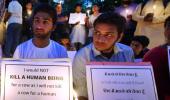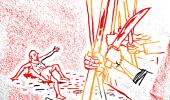Junaid was my son.
He was son and brother also to the people on the train compartment of his last journey.
He was son or brother also of those at the railway station where he breathed his last breath.
This moving excerpt from Harsh Mander's Partitions Of The Heart: Unmaking The Idea Of India reveals why we must immediately end the hatred surging across north India before it consumes us all.

Hafiz Junaid was my son.
I did not know him when he lived.
But in his death, in the way he died, I mourn him like a son.
His dreams were unfamiliar to my agnostic world.
He wanted to become a scholar and teacher of the Quran, and perhaps one day an imam.
For this, from the age of six, he was sent to study in a madrasa in neighbouring Nuh, Haryana.
He was a sincere and bright student who had memorised the Quran, all 80,000 words of the holy text.
He was declared a hafiz in recognition of this achievement.
Hafiz in Arabic means one who remembers, but also one who is a custodian of the sacred words of the Quran.
In other ways, Junaid was like any other boy of his age.
His friends recall that he was fond of flying kites, playing marbles, and most of all cricket.
'He was an all-rounder -- best in batting, best in bowling, best in fielding,' one of his friends fondly recalls.
He wanted to buy a second-hand bike one day.
He loved to bathe in the village pond.
He did not use swear words, and liked new clothes and perfumes.
He would return to his home only once a year, during the month of Ramzan.
The Ramzan of 2017 he proudly recited the entire Quran from memory, to pious gatherings of his own village, over twenty days.
He had completed this recitation of the Quran one day before he was to die.
In appreciation, the villagers had made small offerings of money to him.
His father added his contribution, and with a total sum of Rs 1500, he set out with his brothers to the old city of Delhi to purchase new clothes, prayer mats and some gifts.
He wore jeans, unusual for him, for his shopping adventure to the big city.
But he also wore a skullcap on his head.
This was to be his fatal undoing.
I travelled with a band of my friends to his village Khandawali in Faridabad district of Haryana.
We felt compelled to say to his bereaved family that we grieved with them after Junaid's brutal lynching.
We knew that these words may mean little to a family that has been so brutally dispossessed, but for whatever they may be worth, we felt that these words still must be spoken.
Just two months earlier, we had made a similar journey to share in the same way in the pain of the family of cattle trader Pehlu Khan in Nuh who had been lynched by mobs claiming that he was smuggling cows for slaughter.
I wondered how many such journeys -- of solidarity? of atonement? -- will we have to make.
Before we resolve to say as a country -- no more.
Until then, we need at least to say to those devastated by hate violence -- We share your anger.
We share your sorrow.
It does not make your pain less.
But know at least that you are not alone.
We went to the village a day after a sombre and melancholy Eid was observed in the village, as in many parts of India.
Men had gathered soberly in mosques to offer the traditional Eid prayers together.
But some wore black bands on their sleeves as token of their anguish.
Even those who did not -- uncertain if a mark of protest was fitting in a festival of love and peace -- still carried hurt, fear and bewilderment in their hearts.
What has happened to our country? What is our place in this country? We always believed we were equal citizens of the country we love.
Were we wrong?
We found crowds outside their modest village home.
Junaid's father Jalaluddin, less than fifty years old, looked both numb and stunned, as though he still could not comprehend or accept what had happened.
He was unused to the milling guests from the city.
In one corner, a local police inspector in plain clothes was grilling his sons about the details of the incident, but curiously writing nothing in his notebook.
A village official came in and said peremptorily to Jalaluddin that he must clean up his house because a senior politician, a former chief minister, would be visiting later in the day.
Jalaluddin accepted our words of condolence wordlessly.
'My sons are very frightened', he only said.
'I hope my older boy Shakir who is in hospital gets well soon.
He has two small children.'
The women in our group went in and sat with Junaid's mother, who was inconsolable.
Communist Party of India-Marxist leader Subhashini Ali was also with her.
'My son Junaid was too young to understand that he should not have worn a skullcap,' his mother Saira Begum mourned.
My friend John Dayal went into the women's chamber and said to Saira that he had brought a prayer from his wife for her.
They prayed together.
We sat on string cots outside.
People spoke of how frightened everyone is of travelling outside their village, walking, on trains or in buses.
Frightened of wearing a skullcap, a beard, a burka.
Frightened of looking Muslim.
Hashim, Junaid's eighteen-year-old brother, who wore a beard and skullcap, and was also knifed in the train, spoke to us haltingly of the horrors of that evening.
Both brothers studied in madrasas, Hashim in Surat and Junaid in Nuh.
They were home for Ramzan and Eid on their annual vacation.
The family was poor, and their father and brothers survived variously by cultivating their small piece of land, driving a taxi, and casual labour.
These two brothers had set out a different path for themselves of studying the Quran and becoming imams.

After their Eid shopping at Jama Masjid that day, on 24 June 2017, the three brothers -- Shakir, Hashim and Junaid -- took a local train from the Sadar Bazar station and found seats.
Crowds entered at Okhla, and Junaid gave up his seat to an old man.
A group of fifteen men asked the others roughly to vacate their seats.
When they refused, they slapped and beat them, threw off their skullcaps, pulled the beards of the older boys, abused them for their faith, and called them Pakistanis, beef-eaters and a vulgar slang for the circumcised.
Seeing the situation worsen frighteningly, one of them managed to call their brothers in the village, urging them to come to their rescue at Ballabhgarh station, where they were to alight for their village.
The station came, but the men did not allow the boys to leave the train.
The brothers who had come to their rescue were also pulled in.
In the nine minutes from Ballabhgarh to the next station, Asaoti, the men took out knives and stabbed the three brothers several times, even as they screamed for help.
Not one person came to their rescue.
A few took videos and pictures on their phones instead, as the compartment filled with blood.
Several egged on the lynch mob.
These included the old man to whom Junaid had given his seat.
At the tiny rural station Asaoti, the three boys were thrown off the train.
Some of the killers may have also got off in the melee.
The train stopped just for a minute, and then went ahead on its journey.
The brothers were desperate, but no one at the station came to their rescue.
No passenger, no rail staff, no police persons, and none of the vendors and shopkeepers at the station.
Two other brothers also lay wounded.
The older brothers carried the boys across the tracks to the entrance of the railway station.
One of the brothers managed to contact a private hospital in Palwal.
Its ambulance came after forty-five minutes.
Junaid bled to death some time through all of this, his head cradled in his distraught brother's lap.
He was declared dead when they reached the hospital.
My colleagues and I drove to Asaoti station after we left the family in their grief.
We spoke to the rail officials at the station, and to the shopkeepers around the station.
We heard only these words from everyone of them: We saw nothing at all that evening.
The railway officer who was on duty at that time admitted, 'The guard did send a message about someone being thrown off the train.'
But he added, 'I was at the controls. I could not leave my table. I have too little staff. I saw nothing.'
The shopkeepers at the entrance of the station -- with a vantage of all the platforms -- insisted they saw neither the injured boys, nor the arrival of the ambulance.
Just one Muslim shop hand whispered to us that the bleeding boy lay at the entrance of the station visible to all for forty-five minutes.
But he did not have the courage to say this publicly, or to reach out to help the boys.
Junaid was my son.
He was son and brother also to the people on the train compartment of his last journey.
He was son or brother also of those at the railway station where he breathed his last breath.
And yet we let him die.
Excerpted from Partitions Of The Heart: Unmaking The Idea Of India by Harsh Mander, with the kind permission of the publishers, Penguin Random House India.











 © 2025
© 2025